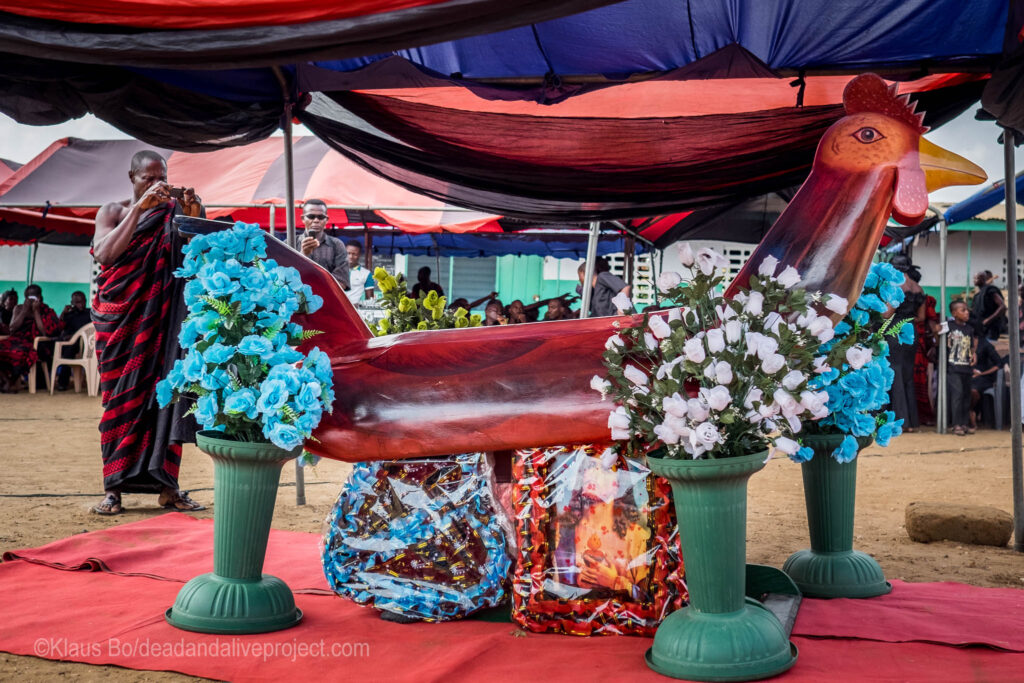In many parts of the world, funerals are silent, solemn affairs. But in Ghana? Let’s just say you might mistake it for a festival — with matching cloths, brass band music, jollof, and sometimes even fireworks. 🎆
Yes, Ghanaian funerals are emotional, but they are also bold celebrations of life. Let’s take a cultural walk into the heart of Ghana’s most dramatic—and beautiful—customs around death.
1. Celebrating a Life Well-Lived 🎉
In Ghanaian culture, especially among the Akan, Ga, and Ewe tribes, death is not the end. It’s a passage — a transition to the ancestors’ realm. So when someone lives to a ripe old age, we celebrate! Think of it as a graduation into eternal legacy.
🧓🏾 Grandma didn’t just pass away. She was promoted to ancestor.
2. It’s All in the Cloth 👗🖤
Forget plain black suits. Ghanaian funerals come with their own fashion code! Families wear beautifully woven kente, ntoma, or adinkra cloth, each symbolizing something unique.
- Black/Red: Grief and mourning (for close relatives)
- White/Black or White/Gold: Celebration of a long, fulfilled life
- Custom-printed cloths: Yes, families print the deceased’s face on cloth for everyone to wear 😮
And don’t be surprised if the fabric becomes your weekend outfit for the next month.
3. The Dancing Pallbearers 💪🏾💃🏾
If you’ve ever seen the viral dancing pallbearers on social media — yes, those guys are very Ghanaian. They’re called “professional coffin dancers,” and yes, it’s a thing. For the right fee, they’ll lift your loved one (literally and emotionally) with coordinated dance steps.
💡 Fun fact: The more dramatic the pallbearers, the higher the status of the deceased. It’s like booking a celebrity DJ… but for your final party.
4. Funeral Food Is a Whole Menu 🍛
You thought you were going to cry and leave? Not in Ghana.
Expect:
- Jollof rice or waakye
- Fufu with light soup
- Sobolo or malt drinks
- And sometimes… takeaway packs 👀
And trust us, Auntie Akua will judge the funeral based on the food.
5. Funeral Posters Are Everywhere 📰
Ever seen a wall full of posters with “What a Shock!” or “Gone Too Soon”? Welcome to Ghana. Funeral posters are part of the culture — they announce who’s passed away, their age, the funeral date, and even the location of the after-party (seriously).
It’s not uncommon to find your long-lost cousin’s funeral poster on a tree next to the chop bar.
6. The “One-Week” and the “Final Funeral” 🕯️
There are usually multiple stages:
- One-Week Celebration: A mini gathering exactly 7 days after death
- Final Funeral Rites: The grand, music-filled event — often months later
Think of the “one-week” as the teaser, and the final funeral as the season finale.
7. Why We Celebrate, Not Just Cry ❤️
Ghanaians believe a soul lives on. So funerals are not just for mourning, but for:
- Thanking God for the person’s life
- Sending them off with joy
- Reuniting family members
- Reaffirming cultural identity
And most importantly: reminding the living to live well, because… you never know who’ll be printing your face on a funeral cloth 😅
🌐 Related Reads to Explore More:
- Inside a Ghanaian Traditional Marriage Ceremony
- What to Wear to a Ghanaian Funeral or Traditional Event
- Meaning Behind Ghanaian Names and Naming Ceremonies
A Ghanaian funeral is not just an event; it’s an experience. It’s grief wrapped in dance, sorrow mixed with song, and remembrance dressed in style. It’s not morbid—it’s moving.
So when the brass band starts playing, don’t just stand there. Grab some fufu, clap along, and celebrate a life that was — and will always be — remembered.

